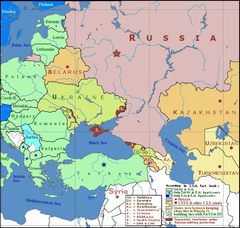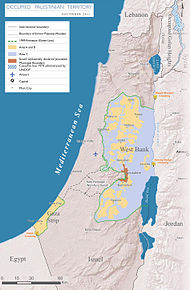|
Frozen conflict
In international relations, a frozen conflict is a situation in which active armed conflict has been brought to an end, but no peace treaty or other political framework resolves the conflict to the satisfaction of the combatants. Therefore, legally the conflict can start again at any moment, creating an environment of insecurity and instability. The term has been commonly used for post-Soviet conflicts, but it has also often been applied to other extended and unresolved territorial disputes.[1][2][3] The de facto situation that emerges may or may not match the official position asserted by either party to the conflict. For example, in the Division of Korea, both North Korea and South Korea officially assert claims to the entire peninsula; however, there exists a well-defined border between the two countries' areas of control. Frozen conflicts sometimes result in partially recognized states. For example, the Republic of South Ossetia, a product of the frozen Georgian–Ossetian conflict, is recognized by eight other states, including five UN member states; the other three of these entities are partially-recognized states themselves. Since aggressors are not defeated, frozen conflicts can be seen as appeasement and rewarding aggression.[4]
Current frozen conflictsAfricaWestern Sahara The Western Sahara conflict has been largely frozen since a ceasefire in 1991, although various disturbances such as the Independence Intifada have broken out since then. Control of the territory of Western Sahara remains divided between the Kingdom of Morocco and the Polisario Front.[5] AsiaAbkhazia and South OssetiaThe Abkhaz–Georgian conflict and Georgian–Ossetian conflict have led to the creation of two largely unrecognized states within the internationally recognized territory of Georgia. The 1991–92 South Ossetia War and the 1992–93 War in Abkhazia, followed by the Russo-Georgian War of August 2008, have left the Russian-backed republics of South Ossetia and Abkhazia in de facto control of the South Ossetia and Abkhazia regions in north and northwest Georgia. These interventions have been interpreted as a Kremlin strategy to destabilize other post-Soviet states and extend Russia's sphere of influence.[6][7] Cyprus The Cyprus dispute has been frozen since 1974. The northern part of Cyprus is under the de facto control of the Turkish Republic of Northern Cyprus, but this is not recognized internationally except by Turkey.[8][9] Israel, Palestine, and the Golan Heights The Arab–Israeli conflict is a perennial conflict between Israel and its Arab neighbours, including the Palestinian National Authority. Israel refuses to recognize Palestinian statehood, while some Arab countries and groups refuse to recognize Israel. Israel has de facto control of East Jerusalem and claims it as its integral territory, although it is not internationally recognized as such. Similarly most of the Golan Heights are currently under de facto Israeli control and civil administration, whereas most of the international community rejects that claim. The United States formally recognized Israeli sovereignty over the Golan Heights in 2019 through a proclamation by President Donald Trump. However, in recent years, a few Arab states and Israel had formed an alliance to contain the Islamic Republic of Iran and its proxies as part of the Iran–Israel proxy conflict. Kashmir India and Pakistan have fought at least three wars over the disputed region of Kashmir, in 1947, 1965, and 1999. India claims the entire area of the former princely state of Jammu & Kashmir on the basis of its ruler formally acceding to India[citation needed] amidst a Pakistani invasion after partition, and administers approximately 43% of it. Pakistan has also claimed it since the partition—based on its majority Muslim population, and controls approximately 37% of the region while encouraging proxy war tactics in Kashmir.[10][11] The remaining territory is controlled by the People's Republic of China; some of it was occupied during the Sino-Indian War, and some was conferred on the PRC by Pakistan. Korean PeninsulaThe Korean conflict was frozen from 1953, when a ceasefire ended the Korean War. Both North Korea and South Korea governments claim the entire Korean peninsula, while de facto control is divided along the military demarcation line in the Korean Demilitarized Zone. Both North Korea and South Korea are recognized by the vast majority of other nations, although they do not recognize each other. Mainland China and TaiwanThe conflict between Mainland China and Taiwan has been frozen since 1949. No armistice or peace treaty has ever been signed and debate continues as to whether the civil war has legally ended.[12][13] Officially, both the People's Republic of China (PRC) based in Beijing and the Republic of China (ROC) based in Taipei consider themselves to be the sole legitimate government of the entirety of China.[14] While the latter especially is not recognized by a majority of countries and states internationally, it remains a de facto independent administration in Taiwan and several other islands, and the PRC's de facto administration is in Mainland China, Hong Kong and Macau. EuropeKosovoThe dispute over the status of Kosovo remains frozen since the end of the Kosovo War, fought in 1998–1999 between Yugoslav forces (the Federal Republic of Yugoslavia) and the ethnically Albanian Kosovo Liberation Army. The Kosovo region has been administered independently by the United Nations Interim Administration Mission in Kosovo since the war. Kosovo unilaterally declared its independence from Serbia in 2008, but it is not recognized by all countries worldwide, as Serbia still considers Kosovo part of its territory.[15][16] TransnistriaSince the ceasefire which ended the Transnistria War (1990–1992), the Russian-influenced breakaway republic of Transnistria has controlled the easternmost strip of the territory of Moldova. The republic is internationally unrecognized, and Moldova continues to claim the territory. Former frozen conflictNagorno-KarabakhThe Nagorno-Karabakh conflict was a frozen conflict with periods of full-scale escalations.[17] The dissolution of the Republic of Artsakh following the 2023 Azerbaijani offensive in Nagorno-Karabakh was an end to this frozen conflict. See also
References
|
